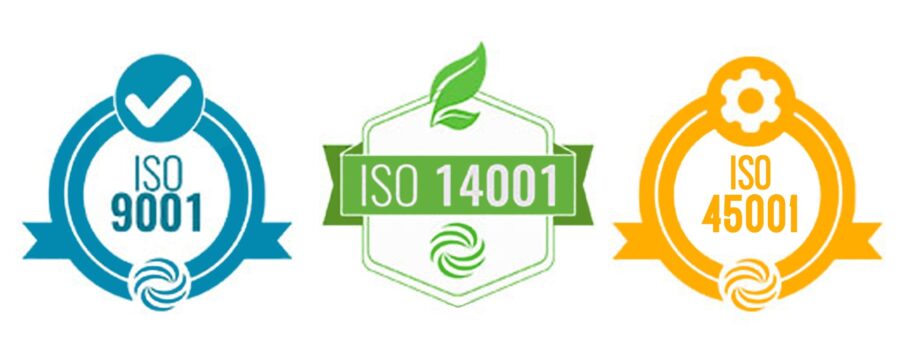ISO Management Systems enhances organizational performance. It lays out the requirements and procedures that an organization can adopt to achieve their set goals and to create a continuous improvement culture based on self-assessment, evaluation, correction of identified gaps, improvement of processes and operations through management commitment, and employee awareness. ISO 14001, ISO 45001, and ISO 9001 are the most in-demand and widely used ISO Standards. The comparison between ISO 9001, ISO 14001, and ISO 45001 will give you a complete understanding of the management systems, their similarities, differences, and how they can benefit your business and career.
What is ISO 9001:2015?
ISO 9001 is the global standard that lays out the requirements for a standard quality management system (QMS). By adoption and implementation, organizations are able to consistently and efficiently provide quality products and services that meet customer satisfaction and QMS regulatory requirements. It is the only standard in the 9000 series to which organizations can be certified, and the most popular. It focuses on seven quality management principles which are: leadership, process approach, engagement of people, customer focus, evidence-based decision making, improvement, and relationship management.
What is ISO 14001:2015?
ISO 14001 provides the guidelines and standards for environmental management systems. By adopting and implementing the standard, organizations are able to improve their environmental impact and sustainability using an effective, globally recognized, and accepted environmental management system. The ISO 14001 Standard applies to all organizations (large and small), it is flexible and used by businesses for compliance purposes which helps them stay off public relations scandals, avoid fines, and increase positive environmental engagement and business efficiency.
What is ISO 45001:2018?
ISO 45001 is the international standard that provides organizations with specific requirements for occupational health and safety management systems that, if adhered to, will help promote health and safety at work, improve operations, and promote business longevity. ISO 45001 superseded OHSAS 18001 in March 2018. ISO 45001 aims at reducing occupational accidents, injuries, and ill-health, whilst focusing on improving physical and mental health. For organizations to enjoy the advantages of ISO 45001 and to achieve its outcomes, there must be leadership and commitment from top management, and workers participation. It is applicable to all organizations across all industries ranging from small businesses to multinationals.
Comparison between ISO 9001, ISO 14001, and ISO 45001
ISO 45001 is the recently published ISO standard on occupational health and safety management systems. ISO 9001 and 14001 were both revised in 2015, while ISO 45001 was published in 2018. All three standards are based on a high-level structure that makes it easy for organizations to integrate all 3 of them if they desire to. The table below provides the comparison between ISO 9001, 14001, and ISO 45001 to give you insightful knowledge on all three standards and the benefits they offer.
Comparison between ISO 9001, ISO 14001, and ISO 45001
|
||
ISO 9001 |
ISO 14001 |
ISO 45001 |
| ISO 9001 helps organizations meet regulatory requirements, to provide customer satisfaction, and quality products and services | ISO 14001 helps organizations prove their commitment to environmental sustainability by reducing industrial waste and environmental damage | ISO 45001 helps organizations provide objective proof to staff, partners, clients, and stakeholders that ensuring health and safety is at the core of the business |
| While planning to ISO 9001, all actions must address ISO 9001 risks and opportunities | While planning to ISO 14001, all actions must address ISO 14001 risks and opportunities | While planning to ISO 45001, all actions must address ISO 45001 risks and opportunities |
| Can be used by all organizations, i.e, small businesses and multinationals across all industries | Can be used by all organizations, i.e, small businesses and multinationals across all industries | Can be used by all organizations, i.e, small businesses and multinationals across all industries |
| Focuses on achieving proposed quality objectives | Focuses on achieving proposed environmental objectives | Focuses on achieving proposed OHSMS objectives |
| Creating and documenting documented information for future use and reference | Creating and documenting documented information for future use and reference | Creating and documenting documented information for future use and reference |
| Performance evaluation includes monitoring, measuring, and analysis | Performance evaluation includes monitoring, measuring, and analysis | Performance evaluation includes monitoring, measuring, and analysis |
| Continual improvement | Continual improvement | Continual improvement |
This comparison between ISO 9001, ISO 14001, and ISO 45001 shows their significant similarities and how they complement each other and can be integrated with other high-level structured standards. To run a sustained organization, at least one of these standards should be implemented. To ensure continual improvement after implementation, the organization needs to be periodically audited against the respective ISO standards. To do this, the organization must consult an ISO 9001, ISO 14001, or ISO 45001 Lead Auditor.
Who is an ISO Management System Lead Auditor?
A Lead Auditor of the ISO management system (ISO 9001, ISO 14001, and/or ISO 45001) is a professional who has undergone the ISO 9001 lead auditor, ISO 14001 lead auditor, and/or ISO 45001 lead auditor training program and acquired the knowledge and skills to plan, implement and report a first, second and third-party audits of the ISO 9001, 14001, and 45001 management systems.
To be a highly valued and respected management system lead auditor, attend the CQI IRCA approved ISO 9001, ISO 14001, and/or ISO 45001 Lead Auditor training course at an IRCA Approved Training Partner (ATP). 3FOLD Training provides career-defining CQI IRCA approved ISO 9001, ISO 14001, and ISO 45001 lead auditor training courses in a 100% live virtual interactive environment with a flexible schedule to accommodate working professionals and promote career advancement.
Want to become a management system lead auditor? Get in touch with us via our enquiry form, whatsapp, or email.






Leave a Reply
Your email is safe with us.